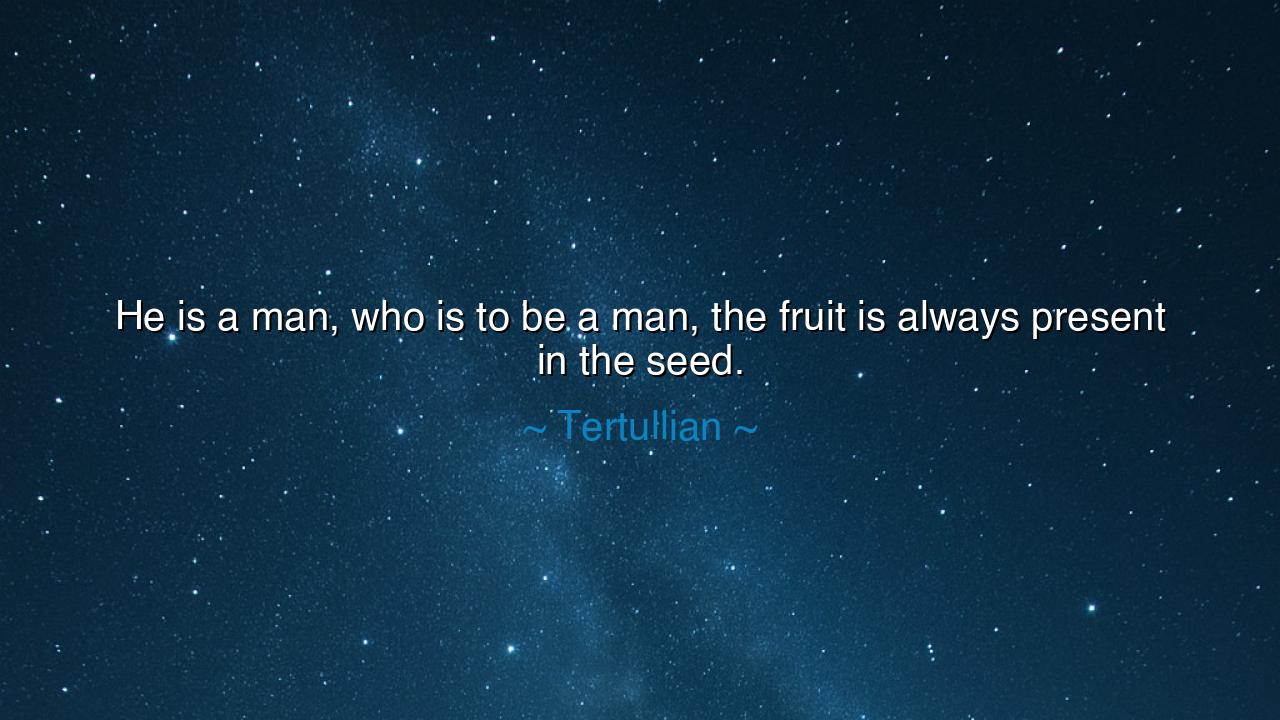
He is a man, who is to be a man, the fruit is always present in






When Tertullian, the fiery thinker of early Christianity, wrote, “He is a man, who is to be a man; the fruit is always present in the seed,” he was not speaking merely of nature or biology, but of destiny, essence, and the mysterious unfolding of life. His words ring with the cadence of eternity — a reminder that what we are to become is already hidden within us, like the oak that slumbers within the acorn. For in every soul lies the seed of greatness, the divine imprint waiting to be awakened through time, struggle, and faith.
Tertullian, who lived in the second and third centuries after Christ, was one of the early architects of Christian theology. His mind was sharp as steel, and his faith fierce as fire. In a world still emerging from the shadows of paganism, he sought to understand how God’s design could be traced in both the spiritual and natural order. This quote, taken from his meditations on the nature of humanity and divine creation, reflects his conviction that the potential for fulfillment lies not in outward circumstances, but within the soul itself. The seed does not borrow its destiny from the wind or the soil; it already carries within it the pattern of its fruit. So too, man is born with the essence of his future — the divine potential placed in him by the Creator.
To say that “the fruit is always present in the seed” is to proclaim that the beginning already contains the end. It is a truth that resonates through every realm of existence. The artist carries the masterpiece within his imagination before the brush ever touches the canvas. The hero bears courage within him long before the battle begins. The saint carries his sanctity not in robes or rituals, but in the quiet faith that endures through trials. What Tertullian saw — and what the wise of every age have affirmed — is that potential precedes manifestation. Life is not the random growth of chaos, but the unfolding of what was always meant to be.
Consider the story of Mahatma Gandhi, a man born into ordinary circumstance, fragile of body but mighty in spirit. Within him, from youth, was the seed of peace, though the world around him was violent and unjust. Through suffering and struggle, that seed grew into a tree of nonviolence that changed the destiny of nations. Gandhi’s life proved the truth of Tertullian’s words — that the seed of virtue needs only the soil of purpose and the sunlight of perseverance to bear immortal fruit. He did not become great by accident; greatness was planted in him from the beginning, and through faith and discipline, it blossomed.
But this truth is not only for saints and sages. Every human being bears within himself the seed of his own destiny. The potential for wisdom, compassion, and creation lies dormant in all — waiting only for cultivation. Too often, however, we live as though we are barren fields, doubting that anything noble could grow within us. We look outward for meaning, unaware that the divine pattern is already woven into our souls. Yet the ancients remind us: what you seek is already in you. The seed may seem small, the soil hard, but within that hidden beginning sleeps the power of transformation.
Tertullian’s wisdom also carries a warning — for not all seeds grow into trees of light. The seed of bitterness, when nurtured, bears the fruit of hatred. The seed of pride, when watered, grows into corruption. Just as the good is present in potential, so too is the capacity for destruction. The soil of the soul must therefore be tended with vigilance. The farmer chooses what he sows; so must man choose what he cultivates within himself. Every thought is a seed, every action a germ of tomorrow’s harvest.
The lesson, then, is both humbling and empowering: your future is not given to you — it grows from within you. The fruit of your life will be the reflection of what you have nourished in your heart. If you would bear love, sow forgiveness; if you would bear wisdom, seek truth; if you would bear peace, root yourself in faith. Do not despise small beginnings, for even the mightiest oak begins as a seed buried in darkness. Trust that within your soul lies the divine pattern of what you are to become.
Thus, remember the words of Tertullian, the ancient sage: “He is a man, who is to be a man; the fruit is always present in the seed.” You carry within you the blueprint of your destiny, written by the eternal hand. Cultivate it with patience, nourish it with virtue, and guard it against despair. For when the time is ripe, that hidden seed — your true self — will rise from the soil of struggle and bloom into the fullness of its purpose. And then, as the ancients would say, you will not merely live — you will become.






AAdministratorAdministrator
Welcome, honored guests. Please leave a comment, we will respond soon